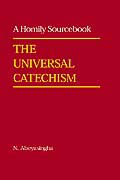A valuable resource for preachers and teachers!!
This item does not qualify for free shipping. However, normal shipping applies and there is never a surcharge.

Includes a chapter on Homiletics, Catechesis and the Catechism, as well as chapters on the lectionary readings and Catechism references for each cycle of the lectionary and and index to Catechism paragraphs.
"My contention is that Vatican II re-affirmed the Tradition. In doing so it provided us with a common/d/om and a common grammar. The Catechism of the Catholic Church, recently published in various vernacular editions, attempts to present this common idiom and grammar. Why not re-learn and re-affirm the idiom and grammar of the Tradition (as it is reflected in the Catechism) and re-read and--especially in our liturgy--re-proclaim this Tradition as an invitation to faith and repentance Coy referring ourselves to the salvific memory enshrined in the Scripture readings of each Sunday)? Perhaps in this way we will begin to communicate. Perhaps we may regain vitality in our ministry by refusing to protect ourselves and others from the truth of the Gospel. Perhaps in the liturgy we, like the great prophets, will not be afraid to realize that God is a God who acts; that God's action is certain even though it is unpredictable.
"The proposal presented in the following pages is simply this:
A valuable resource for preachers and teachers!!
This item does not qualify for free shipping. However, normal shipping applies and there is never a surcharge.